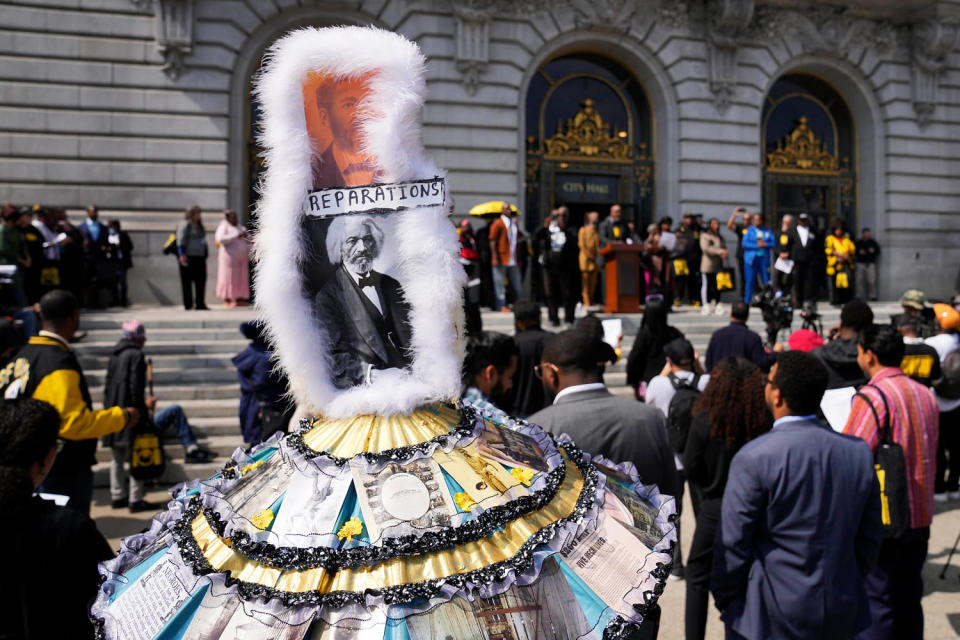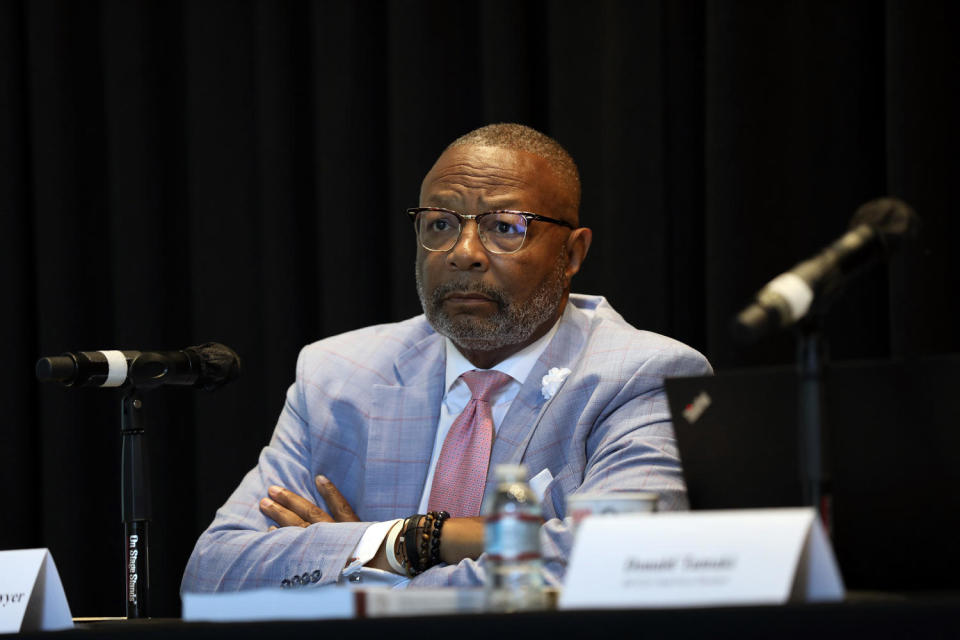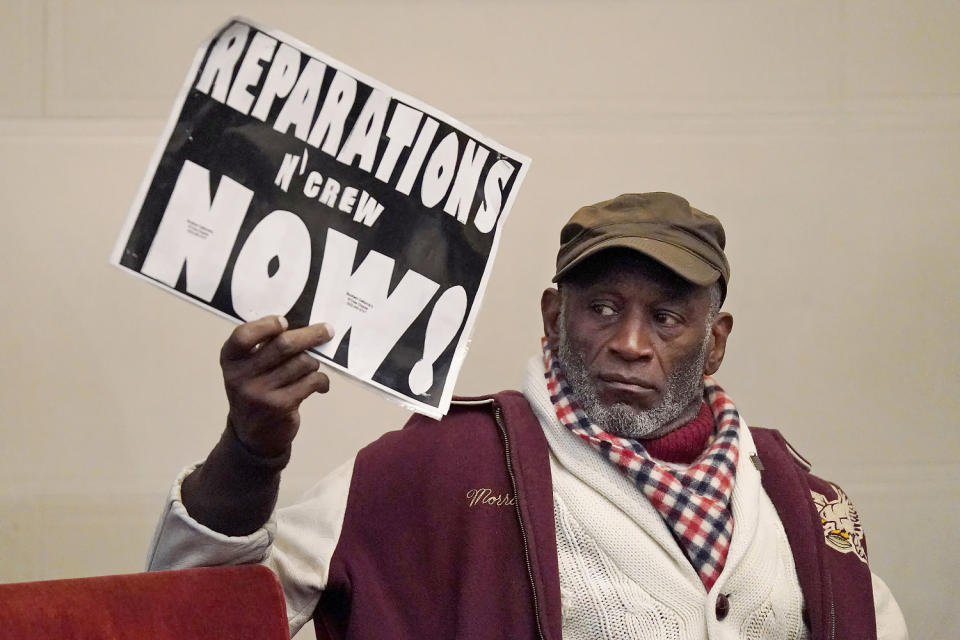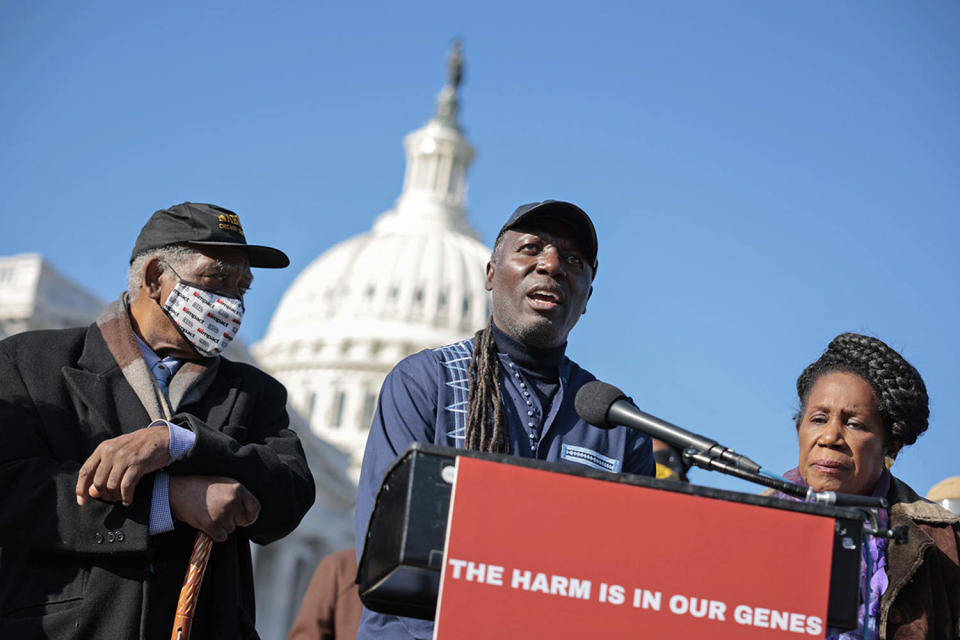Reparations gained historic momentum in 2023 because of California’s efforts
For the first time, this year advocates seeking reparations for the harms inflicted on Black people during centuries of slavery in America saw a movement for redress that elicits hope.
Many municipalities either started or are forming commissions to address compensation to the descendants of enslaved Africans.
California has made the most zealous effort. The state’s reparations task force spent two years researching the impact of the generational damage of the discriminatory practices and produced a 1,100-page report with comprehensive recommendations that it considers to be the blueprint for other cities and states — and the federal government — to follow.
The blockbuster file includes a method to calculate financial compensation for those eligible for redress. More than 400 organizations have signed on to support reparations in the country’s most populous state.
While Evanston, Illinois, became the first city in the country in 2021 to actually pay reparations to its eligible Black residents, and New York recently enacted a commission to study the effects of slavery there, California’s push represents a major swing in the decadeslong fight for reparations. Yet Californians are looking ahead to the next year to see if any of these recommendations will actually come to fruition — and if there is enough political will to make it so.
Indeed, the road to reparations remains arduous.
Opposition is significant. California’s efforts surpassed those of the federal government. And while many cities and states are creating reparation committees, they are far from getting money into people’s pockets.

And then there’s the underlaying reticence of a significant part of the population: “Public opinion — meaning white people and white politicians — is not sympathetic to our plight and how it is tied to slavery,” said Jonathan Wright, a Los Angeles entrepreneur who attended three of the dozen California reparation public hearings.
In fact, a 2022 Pew Research Center poll said that 77% of Black adults believe descendants of enslaved Africans in the U.S. should receive reparations in some way, but only 18% of white respondents agreed.
“Call me a pessimist,” Wright said. “They have benefited from slavery and discrimination for centuries, but they can’t even tolerate the idea that our families for generations have been impacted by this. It’s OK for them to benefit, but not for us to be compensated. That’s what we’re dealing with and that makes me pessimistic.”
Those pushing for reparations understand Wright’s position. But many in California and beyond who are committed have a strategy they believe will be decisive. Their plan is to educate the naysayers or uninformed on why reparations are deserved and needed, and use that newfound support as leverage with politicians who could bring forward reparation studies and proposals.

To that end, Assemblymember Reginald Jones-Sawyer, who was on the California Reparations Committee, has spent much of his time since the publication of the recommendations report visiting groups and communities of all races, sharing knowledge about reparations, how they would work and why they are important.
“And I will tell you, it’s been received well,” Jones-Sawyer said. He said there has been strong engagement and people asked questions that conveyed their interest. “We dispelled a lot of misconceptions” and “explained why this push for reparations is still needed in 2023, 2024 and beyond if we’re going to make this a just society.”
The committee’s report lays out 112 recommendations that include programs around housing, education and public health, among many others. The California Legislative Black Caucus has hired a team of experts to whittle down the massive report to a digestible length. That condensed report will be shared with the public and the California Assembly, which will have to vote on bills based on the recommendations.
Jones-Sawyer said the group plans to ultimately create and present 12 bills that will cover the report’s recommendations. He said the first five bills will be introduced at the start of 2024 and “will span just about every category in the report, whether it’s racial terror, education, the criminal justice system, incarceration rates, homeownership, the wealth gap.”
The members of the CLBC have distinct expertise in each area, Jones-Sawyer said. “We’re going to tackle just about every field of human endeavor. And we have people that have the ability to be able to carry those bills because of their backgrounds.”
The California Senate is made up of 80% Democrats, which could be a positive for these bills. Gov. Gavin Newsom has expressed support for reparations efforts in the past. However, in September he made a point of emphasizing that reparations in the form of cash payments may not be the recourse.

“Dealing with that legacy is about much more than cash payments,” the governor said at the time.
Still, for some Black people in California, the hard work does not translate into optimism. Take Amina Ali, a 52-year-old Oakland resident who has followed the reparations hearings since Newsom gave the go-ahead two years ago to create a commission.
“I won’t hold my breath,” Ali said. “I want it as badly as the next Black person. But I also live in the world. I know the reparations people worked hard for a long time to make the case. I commend them. And they made their very strong case. But I know that there are enough people against it to keep it from happening. Be real: White people don’t want us to have an even playing field.”
But Kamm Howard, founder of the organization Reparations United and co-chair of the National Coalition of Blacks for Reparations in America, is looking to level the field across the nation. He said the Black voting bloc is so strong that it can influence a federal reparations movement, as President Biden is working to avoid Black voter defection in next year’s election. Black voters have a transformative moment to use their influence to “make a demand of the president and the party,” Howard said.
“We’ve amassed a significant amount of power within the party by voting Democrat 80%, 90%, for years. We’re a dependable base within the party. And they know that they cannot win an election without us at this point,” the Reparations United founder said.

“And if he’s totally dependent on the Black vote, then we have the power to leverage that for a reparations commission,” Howard continued. “I believe that the only way Biden can earn the vote and energize Black people and reverse a potential defection of Black voters is to make executive order to create a reparations commission before the election.”
In 2021, White House press secretary Jen Psaki said Biden supported studying reparations for Black people. Two months later, the House Judiciary Committee voted to advance H.R. 40 to a full vote, the furthest a bill to create a commission to study the effects of slavery has ever moved in Congress in the three decades since the legislation was first proposed. H.R. 40 was re-introduced in 2023; on the federal level, movement beyond that has been slow.
Howard said California’s in-depth work is a benchmark on what could be done on a federal level. “What California did was tremendous,” he said. “We want to make reparations and the redressing of past social ills and crimes in America a standard in America, something that is appreciated for the benefit that it will produce.”
In 2020, a Citigroup study indicated that the U.S. cost itself $16 trillion in the last two decades alone because of racism. “That shows that reparations is not a drain on America,” Howard said. “It would be an investment in America. Every dollar spent on reparations, you get that dollar back plus another dollar or $2 in return on the investment, particularly around Black business development.”
All of this hopeful thinking requires patience. “We didn’t just get into this position overnight. This is 400 years in the making,” Howard said. “So it’s not something that happens quickly. But I’m in it for the long haul. And a lot of other people are, too.”
For more from NBC BLK, sign up for our weekly newsletter.
This article was originally published on NBCNews.com

